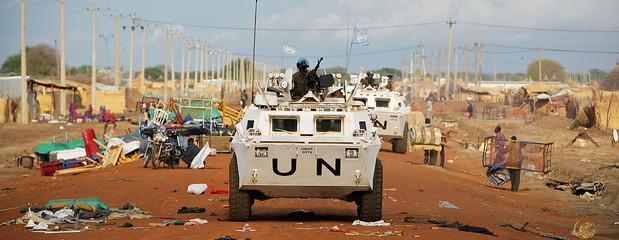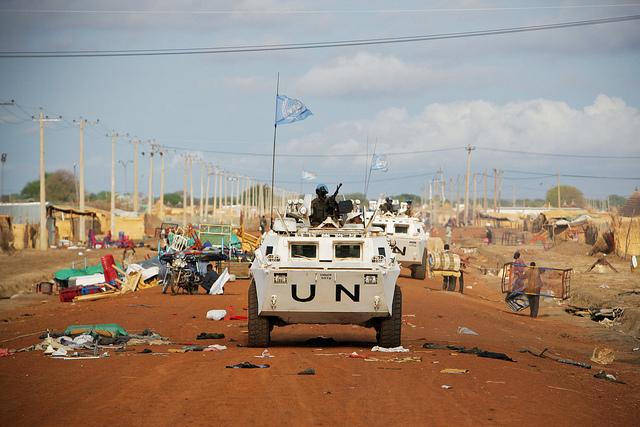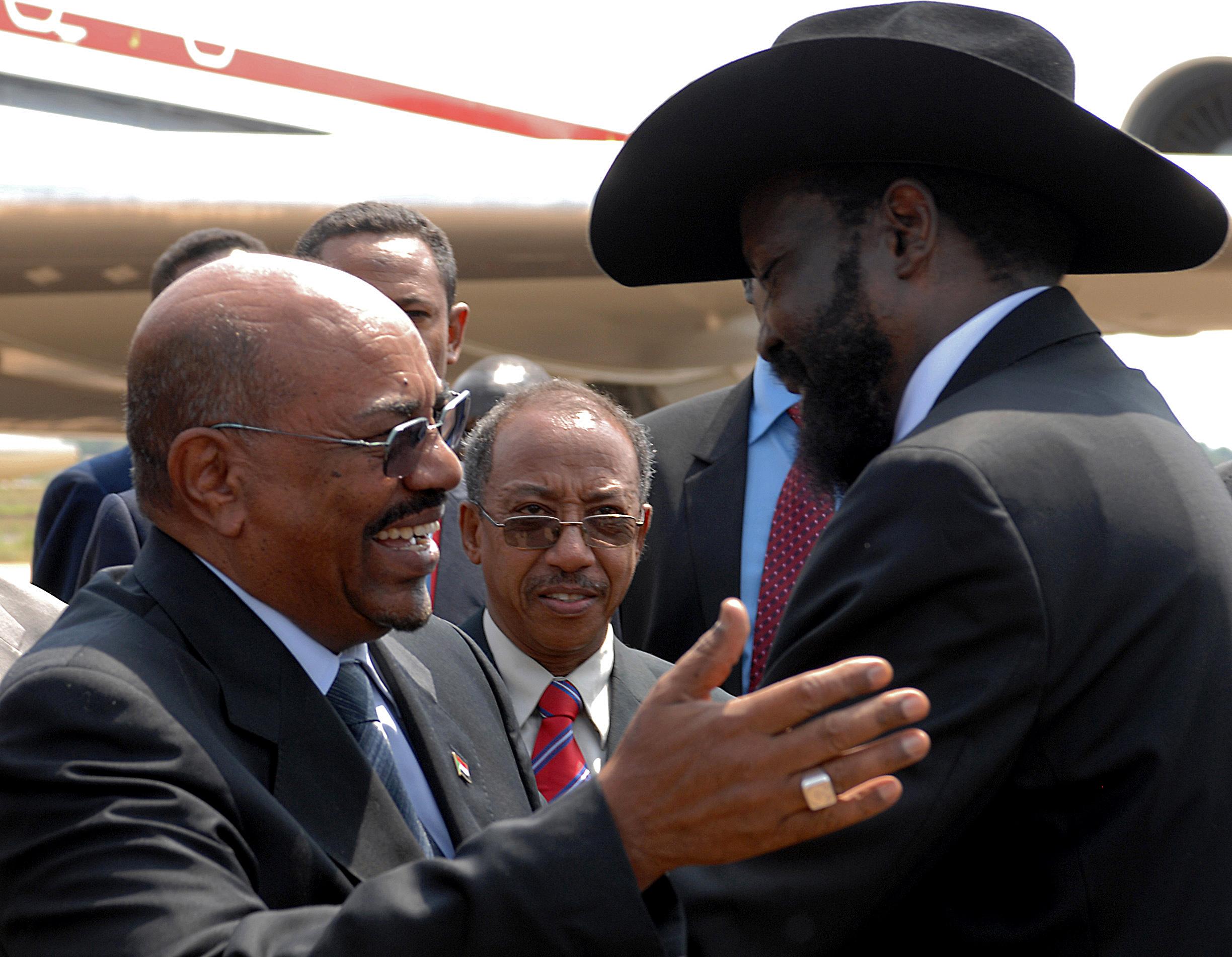UN peacekeepers in South Sudan: protecting some of the people some of the time

While the UN’s actions are appreciated by the thousands seeking refuge in protected sites, there are millions more outside who are suffering. The UN peacekeeping mission has simply not done enough.

United Nations peacekeepers on the border between Sudan and South Sudan. Credit: UN Photo/Stuart Price.
Two years ago, war broke out in South Sudan. What started off as a political power struggle between President Salva Kiir and his former vice president Riek Machar was quickly manipulated into ethnically-aligned violence that spread with extraordinary speed and intensity. Civilians quickly became the prime target.
As violence escalated, the United Nations peacekeeping mission in South Sudan (UNMISS) took the unprecedented decision to open its gates to thousands of civilians fleeing violence. While the opening of a number of Protection of Civilian (PoC) sites across the country did not prevent mass violence, there is no doubt that it reduced the number of people killed or injured.
As one man living in a PoC site in Juba said: “If it was not because of peacekeepers, all of us would have been killed.” The speed with which the decision was taken to open the gates was crucial in saving lives. It was also a direct response to the shadow that fell over peacekeeping missions during the 1994 genocide in Rwanda, when the gates stayed closed and thousands were killed as a result.
A report launched today by the International Refugee Rights Initiative presents the views of a number of these civilians, many of whom who are still living in one of the PoC sites. Two years on, they remain grateful for the protection offered by the camps but are also disappointed that the UN has not been able to do more. Despite the UN’s presence, atrocities have still been committed, and civilians are frustrated that protection appears to be available only inside the camp.
As a woman living in the PoC site in Bor said, “They tell us they can only protect us if we stay here. They say that if you go out far from the camp, we can’t protect you.” And while they might be safer inside the camps (although on occasion the camps themselves have been attacked), the humanitarian situation is dire. People have been reduced to eating leaves and burning plastic to cook the small amount of food they have as there is nothing else left.
Once again, civilians are bearing the brunt of a war they did not start. Defined by the scale and nature of atrocities, this war has forced itself into the heart of communities to devastating effect. The use of ethnicity by those in power as a tool for mobilising constituents within the conflict has been a particularly pernicious strategy. It has torn apart the social fabric that had already been weakened by decades of conflict and injustice, and the legacies of this current conflict at both a local and national level are hard to exaggerate.
And not only are these atrocities themselves appalling, but they make the resolution of conflict much, much harder. Even where peace agreements, power sharing deals and electoral processes are put in place, the legacies of atrocities stick like glue to communities long after those with the weapons have been officially disarmed and the international community has moved onto the next crisis. As a member of the donor community said, “We have to acknowledge the collective failure of the international community. And UNMISS has played a big part in that.”
Set against this context, it is clear that the need for better responses to situations of conflict in which atrocities take place could not be more pressing. The opening up of PoC sites was certainly a step in the right direction albeit one that needs careful evaluation, and has set a precedent for future outbreaks of violence – whether in South Sudan or other places where peacekeeping forces are operating. As one man said, “There should always be a camp like this ready for civilians in danger.”
While their actions are appreciated by the thousands in the sites, there are millions more outside who are suffering. They have simply not done enough.
For UNMISS, the challenges it faces are considerable: with its mandate expanding to monitor the implementation of a peace agreement signed in August 2015, there is a real danger that the protection of civilians will only be diluted further. This would be a disaster in a context in which the trajectory of the conflict continues to deteriorate in spite of the peace agreement.
Yet the existence of the peace agreement presents a conundrum: on the one hand, there is little faith in the agreement and much to suggest that the parties will return to war; on the other, if the agreement is not supported, it will definitely fail with devastating consequences for civilians.
In addition to internal complications of poor governance and a weak state structure, the conflict’s geopolitical positioning further complicates the situation.
With both government and opposition allegedly stockpiling weapons (which are in plentiful supply); and with another internal war taking place over the border in neighbouring Sudan’s Blue Nile and Southern Kordofan states, coupled with long-established networks for destabilisation at the disposal of neighbouring governments, many of the ingredients remain in place for a protracted conflict.
Ultimately, of course, the antidote to these atrocities is not a peacekeeping force, which can never be anything more but palliative, but an inclusive political solution to the conflict and accountability for what has taken place – a solution that goes beyond the redistribution of power among a small minority who have access to weapons and the inclination to use them.
But in the meantime, while some protection for some of the people some of the time is undoubtedly better than no protection at all, it offers little comfort to the majority of civilians whose lives, as a result, remain fundamentally unsafe.
Lucy Hovil is a Senior Researcher at International Refugee Rights Initiative. Follow her on twitter at @LucyHovil.




Thanks for helping me with a better understanding of this situation.
It is so complex and I fight a sense of hopelessness as I read about what could possibly work. Worldwide ethnic tensions are the hardest to solve and the underlying cause of so much bloodshed and grief. And yet we must continue to look for ways that lead to political peace where people can exist together and economic stability for all. I applaud the work of UN as limited as it seems to be.